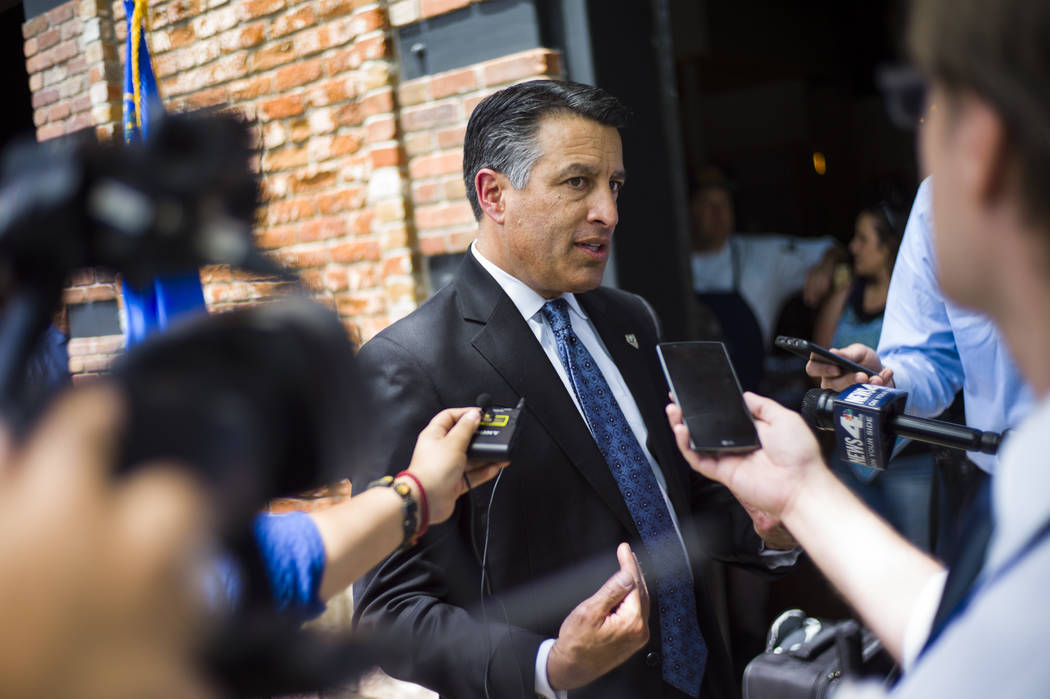Gov. Brian Sandoval misses opportunity with veto of insurance-definition bill

Gov. Brian Sandoval opposed the bill to raise the minimum wage in Nevada to $12 per hour; when it arrived on his desk, he promptly vetoed it.
According to the governor, Senate Bill 106 would unnecessarily burden small business, cost jobs and raise prices. This certainly was the position of groups he cited in his veto message, ranging from chambers of commerce to the Koch Brothers pressure group Americans for Prosperity.
But the governor also vetoed another minimum wage bill, one that could have helped define a significant benefit for workers without raising pay rates.
Assembly Bill 175, introduced by Assemblyman William McCurdy II, D-Las Vegas, would have provided a comprehensive definition of “health insurance” related to the minimum wage in the Nevada Constitution.
Under an amendment passed in 2004 and 2006, employers must pay at least the federal minimum wage (currently $7.25 per hour) if they provide health benefits to their employees, or $8.25 per hour if they don’t. But the constitution says only that offering health benefits “shall consist in making health insurance available to the employee and the employee’s dependents at a total cost to the employee for premiums of not more than 10 percent of the employee’s gross taxable income from the employer.”
What kind of insurance? What must it cover? The initiative doesn’t say, which has led to some shady practices. Some employers offer hospital indemnity plans or insurance that doesn’t cover basic things — such as surgeries or emergency room stays — in an effort to avoid paying the higher wage.
Enter SB 175, which would have made explicit precisely what “health insurance” means under the constitution: a plan that covers ambulatory services, emergency services, hospitalization, maternity and newborn care, mental health and substance abuse care, prescription drugs, rehab, laboratory services, preventative care, chronic disease management and pediatric care including oral and vision care. That’s the equivalent of a bronze-level plan offered on insurance exchanges under the Affordable Care Act.
Given the lack of concrete definitions in the constitution, and the violations of the spirit and letter of the minimum wage initiative, AB 175 was a good bill. But Sandoval vetoed it, for some of the same reasons he rejected the minimum wage increase.
“None of these statutory requirements are in the Nevada Constitution,” the governor wrote. Naturally; their absence is what gave rise to the bill in the first place.
“On the contrary, these requirements go far beyond what is constitutionally mandated (and possibly even constitutionally allowed), exceeding what Nevada voters likely intended when they amended the Nevada Constitution in 2006 to include” the amendment.
Whatever voters may have intended, however, they certainly didn’t intend for companies to offer non-insurance to get out of paying an extra $1 per hour.
Sandoval further worried the bill might create “a perverse incentive that might force employers to discontinue offering insurance all together. Employees may gain slightly higher wages — assuming such wage increases do not lead to fewer hours and greater job losses — at the cost of losing their health insurance.”
But if those employees aren’t getting health insurance now — at least not in any meaningful sense — shouldn’t they at least get a higher wage?
The governor also cited a court case that sought to define health benefits, by referring to the Nevada Administrative Code. There, health insurance is any expense deductible on federal taxes or benefits provided under a Taft-Hartley trust. But even that doesn’t cure the defect, because some of the non-insurance plans offered by Nevada businesses can fit that definition.
If the Legislature is not to be allowed to define health insurance under the law (although apparently the unelected state labor commissioner can), then perhaps someone else should. A lawsuit that seeks to answer that question will come before the Nevada Supreme Court in September.
All eyes should be on that case, so that the amendment of 2006 might finally be given effect.
Contact Steve Sebelius at SSebelius@reviewjournal.com or 702-387-5276. Follow @SteveSebelius on Twitter.